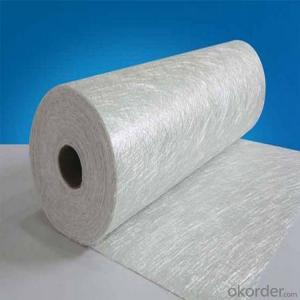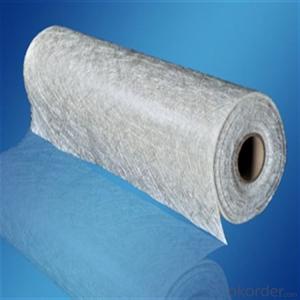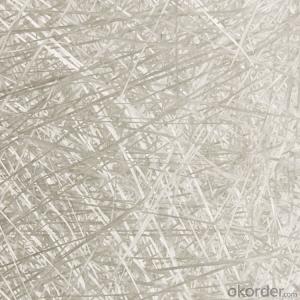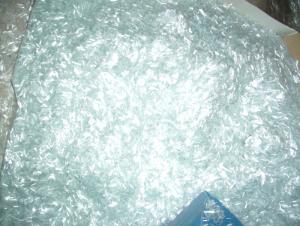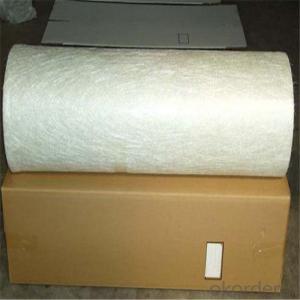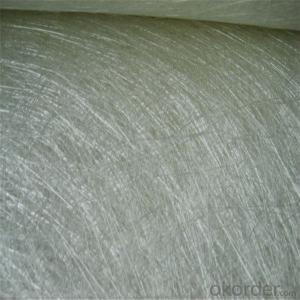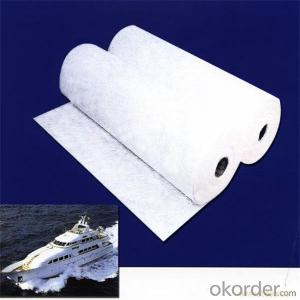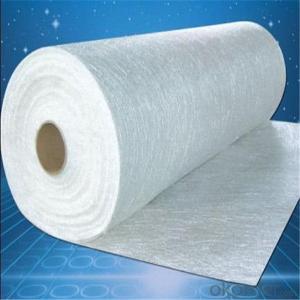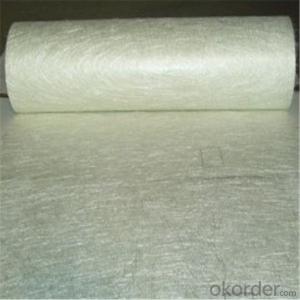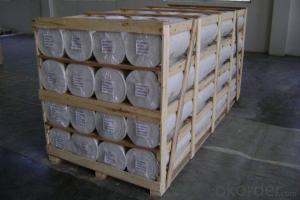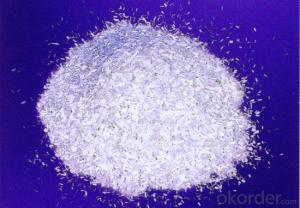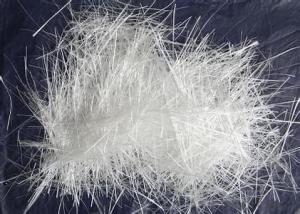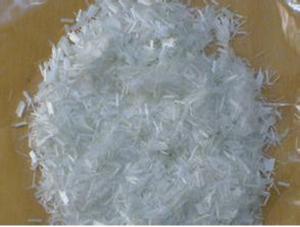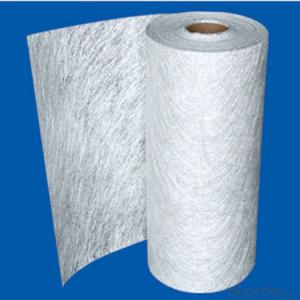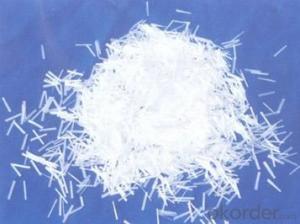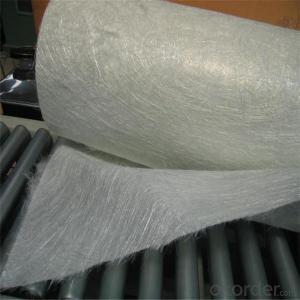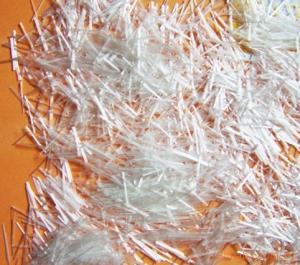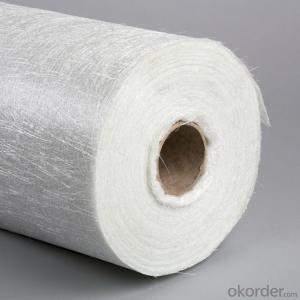Raw Materials Reinforced Fiberglass Chop Strand Mat, Glass Fiber Fabric
- Loading Port:
- China main port
- Payment Terms:
- TT OR LC
- Min Order Qty:
- 1 kg
- Supply Capability:
- 10000 kg/month
OKorder Service Pledge
OKorder Financial Service
You Might Also Like
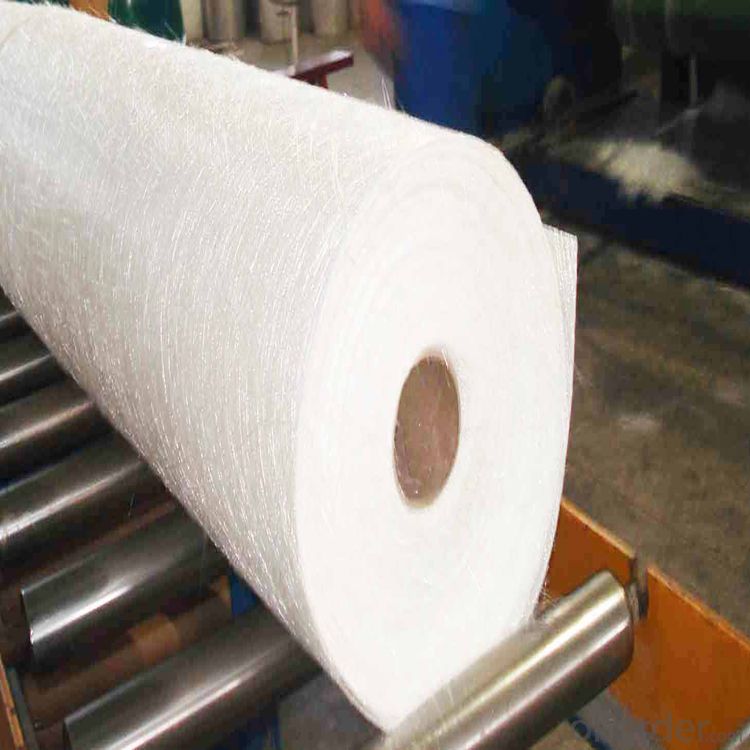
Product Description:
Fiberglass Chopped Strand Mat is fine strand reinforcement material made from E-glass cut fibers laid in a random pattern and bonded with powder or emulsion binder.
It is easy to handle and has excellent moulding performance.
Also, it has rapid resin penetration together with a fast strand wet out time.
The mat also brings a highly translucent finished laminates.
Also,the fine strand input makes the fiber prominence at the finished laminates surface extremely low.
Features
1.Excellent weight uniformity
2.Fast wet out
3.Easy air release
4.Excellent transparency of finished products
5.Excellent laminate
6.Low resin consumption
Application
1.Translucent roof panel
2.chemical storage tanks
3.FRP pipes
4.Boat hulls
5.Decks
6.Truck body panel
7.Cooling towers
8.Corrosion resistand
Specifications:
Item | Over Density | Moisture Content | Chop Density | Polyester Yarn | Width |
(g/m2) | (%) | (g/m2) | (g/m2) | (mm) | |
EMK300 | 309.5 | ≤0.15 | 300 | 9.5 | 50-3300 |
EMK380 | 399 | 380 | 19 | ||
EMK450 | 459.5 | 450 | 9.5 | ||
EMK450 | 469 | 450 | 19 | ||
EMC0020 | 620.9 | 601.9 | 19 | ||
EMC0030 | 909.5 | 900 | 9.5 |
Special products are available according to customer’s requirement.
Product Packaging:
Each Surface Tissue is wound onto a paper tube which has an inside diameter of 76mm and the mat roll has a diameter of 330mm. The mat roll is wrapped up with plastic film,and then packed in a cardboard box or wrapped up with kraft paper. The rolls can be vertically or horizontally placed. For transportation, the rolls can be loaded into a cantainer directly or on pallets.
Quantity
20'GP Container:About 10000kgs
40'HP Container:Aboout 23100kgs
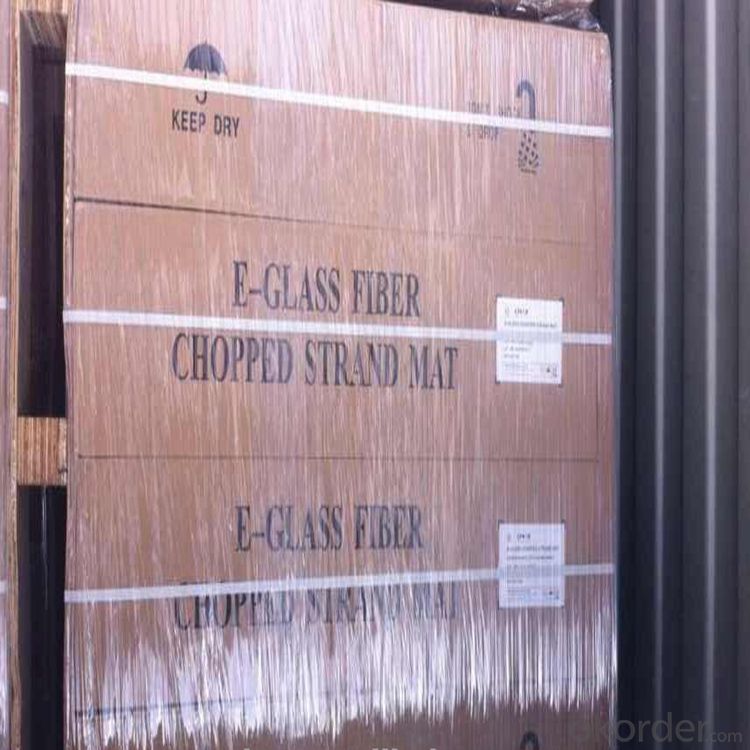
Product Storage:
Unless otherwise specified, Chopped Strand Mat should be stored in a dry, cool and rain-proof area. It is recommended that the room temperature and humidity should be always maintained at 15℃~35℃ and 50%~75% respectively.
Company Information
CNBM (China National Building Material) Group is the largest comprehensive building materials group in China that in integrate scientific research, manufacturing and logistics into one entity. The largest building materials and equipment specialists in China. Upon State Council approval, today CNBM owned more than 300 subordinate manufacturing factories and servicing companies. There are 6 fully owned public listed companies and 11 partially owned with substantial shares public listed companies. In many of these fields, CNBM is playing the leading role in the building industry in the country.
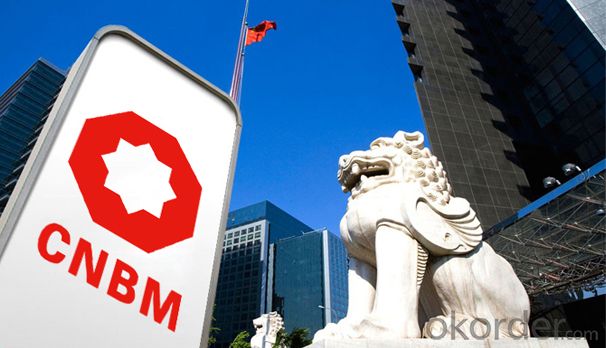
Our Service:
1.Any inquiry will be replied within 24 hours.
2.Professional manufacturer.
1) Print logo in the products;
2) The size and specification can be produce and design according to your demand.
3.High quality,fashion designs,reasonable and competitive price,fast lead time.
4.After-sale service
1) All products will have been strictly quality check in house before packing.
2) All products will be well packed before shipping.
3) All our products have 10 years rot resistance.
5.Faster delivery:sample order in stock,and 15-20 days for bulk production.
6.Payment:you can pay for the order via:T/T,Western Union,MoneyGram,L/C etc.
FAQ:
which kind of glass fiber sample and materials can you provide?
We can provide the glass fiber and glass fiber down stream products samples of E glass, C glass, ECR glass, High alkali glass. The products includes single end roving, assembled roving for different applications( Piping, SMC, panel, winding mill plate) , chop strand for BMC, engineering plastic (PA, PPA, PPT, POM, etc), chop strand mat (from 100gsm-900gsm) for automobile and water tank, etc, woven roving (270gsm-800gsm), surface tissue (25-50gsm), multi-axial fabric of different unit weight.
- Q:Is fiberglass chopped strand compatible with different joining techniques?
- Fiberglass chopped strand is indeed compatible with a range of joining techniques. It offers versatility as it can be connected through various methods, including adhesive bonding, mechanical fastening, and fusion welding. When adhesive bonding is used, a suitable adhesive is employed to connect the chopped strand either to another material or to join multiple chopped strand components together. Mechanical fastening, on the other hand, involves the use of screws, bolts, or rivets to establish a connection between the chopped strand and other materials. Fusion welding is yet another option, where the chopped strand components are joined by melting and fusing the fibers using heat. Thanks to its compatibility with different joining techniques, fiberglass chopped strand proves to be a versatile material suitable for a wide range of applications in industries such as automotive, construction, and aerospace.
- Q:Can fiberglass chopped strand be used in the production of automotive parts?
- Yes, fiberglass chopped strand can be used in the production of automotive parts. Fiberglass chopped strand is a type of reinforcement material that is made by chopping fiberglass strands into small pieces. This material is commonly used in the manufacturing of automotive parts due to its high strength-to-weight ratio, durability, and cost-effectiveness. In the automotive industry, fiberglass chopped strand is often used in the production of various components such as body panels, bumpers, hoods, fenders, and interior parts. It is commonly used in combination with resin to create composite materials that offer excellent strength and stiffness properties. The chopped strand length and orientation can be customized to meet specific design requirements, allowing for a wide range of applications in automotive manufacturing. Furthermore, fiberglass chopped strand offers several advantages for automotive parts production. Firstly, it is lightweight, which helps reduce the overall weight of the vehicle and improve fuel efficiency. Additionally, it has excellent corrosion resistance, making it suitable for automotive applications exposed to harsh environments. Moreover, fiberglass chopped strand has good dimensional stability and can withstand high temperatures, making it suitable for under-the-hood components. Overall, fiberglass chopped strand is a versatile and reliable material that can be effectively used in the production of automotive parts. Its unique properties make it an ideal choice for manufacturers looking to enhance the performance, durability, and cost-effectiveness of their automotive components.
- Q:How is the surface treatment of fiberglass chopped strand done?
- The surface treatment of fiberglass chopped strand is typically done through a process called silane treatment. Silane is a chemical compound that is applied to the surface of the glass fibers. It acts as a coupling agent, bonding the glass fibers to the resin matrix in the composite material. The silane treatment involves applying a thin layer of the silane compound to the glass fibers. This is usually done through a spray application or by dipping the fibers into a silane solution. The silane then reacts with the surface of the glass fibers, forming a covalent bond. The purpose of the surface treatment is to improve the compatibility between the glass fibers and the resin matrix. Without the treatment, the glass fibers may not bond well with the resin, leading to reduced strength and performance of the composite material. The silane treatment also helps to enhance the adhesion between the fibers and the resin, improving the overall mechanical properties of the composite. It can also increase the resistance to moisture absorption, making the material more durable and long-lasting. In addition to silane treatment, other surface treatments may also be used for fiberglass chopped strand, depending on the specific application and requirements. These can include coatings, finishes, or sizing agents, which further enhance the bonding between the fibers and the resin matrix. Overall, the surface treatment of fiberglass chopped strand is a critical step in the manufacturing process of composite materials. It ensures proper bonding and improved performance, making the material suitable for a wide range of applications in industries such as automotive, construction, aerospace, and marine.
- Q:What are the typical moisture absorption characteristics of chopped strand composites?
- Chopped strand composites typically exhibit excellent moisture absorption resistance due to the nature of their construction. The chopped strand mat or fabric used in these composites is typically made from glass fibers or other high-performance materials that have inherently low moisture absorption properties. Additionally, the matrix material used in the composite, such as a resin or polymer, is often chosen for its hydrophobic nature, further reducing moisture absorption. This combination of low moisture absorption fibers and hydrophobic matrix material results in chopped strand composites that are highly resistant to moisture absorption. In practical terms, this means that these composites are less likely to experience dimensional changes, warping, or degradation when exposed to moisture or high humidity environments. However, it is important to note that the moisture absorption characteristics of chopped strand composites can still vary depending on the specific materials used and the manufacturing process employed. For instance, if the composite is not properly sealed or has defects in its structure, it may be more susceptible to moisture absorption. Additionally, certain types of resins or fibers may have higher moisture absorption rates than others. In general, though, chopped strand composites are known for their low moisture absorption characteristics, making them a popular choice for applications where moisture resistance is important, such as in marine, automotive, or construction industries.
- Q:Can fiberglass chopped strand be used in electrical insulation sheets?
- Yes, fiberglass chopped strand can be used in electrical insulation sheets. Fiberglass is a highly versatile material that offers excellent electrical insulation properties. It has a high dielectric strength, which means it can withstand high voltages without conducting electricity. The chopped strand form of fiberglass is often used to reinforce various materials, including electrical insulation sheets, to enhance their mechanical strength and durability. Additionally, fiberglass is resistant to heat, chemicals, and moisture, making it an ideal choice for electrical insulation applications.
- Q:What are the typical mechanical properties of fiberglass chopped strand composites?
- Fiberglass chopped strand composites possess several typical mechanical properties, including high strength, stiffness, and dimensional stability. These composites demonstrate outstanding tensile, flexural, and impact strength, rendering them suitable for a wide range of structural applications. Moreover, their high modulus of elasticity ensures exceptional resistance to deformation when subjected to external forces. In addition, these composites have a low density, making them lightweight and perfect for applications that prioritize weight reduction. Furthermore, fiberglass chopped strand composites display excellent fatigue resistance, enabling them to endure repeated loading without significant performance deterioration. Overall, the mechanical properties of fiberglass chopped strand composites make them a versatile material option across various industries such as automotive, aerospace, construction, and marine.
- Q:Is fiberglass chopped strand suitable for the production of water slides?
- Yes, fiberglass chopped strand is suitable for the production of water slides.
- Q:Can fiberglass chopped strand be used in wind turbine rotor blades?
- Wind turbine rotor blades can indeed utilize fiberglass chopped strand. Given its lightweight, high strength, and resistance to corrosion, fiberglass is a popular choice in the construction of these blades. In the manufacturing process, chopped strand mat, composed of short fiberglass strands bonded together, is frequently employed. These chopped strands are arranged in a specific pattern and subsequently infused with resin to create a composite material that boasts both strength and flexibility. This composite material is then molded into the desired shape of the wind turbine blade. All in all, fiberglass chopped strand is an extensively utilized and appropriate material for the production of wind turbine rotor blades.
- Q:Is fiberglass chopped strand resistant to mold and mildew?
- Yes, fiberglass chopped strand is resistant to mold and mildew. The nature of fiberglass, along with its non-porous surface, makes it highly resistant to the growth of mold and mildew. Unlike organic materials such as wood or fabric, fiberglass does not provide a suitable environment for mold and mildew to thrive. Additionally, the use of a resin matrix in fiberglass manufacturing further enhances its resistance to mold and mildew. This characteristic makes fiberglass chopped strand an ideal material for applications where moisture or humidity is present, such as in bathrooms or outdoor structures. However, it is important to note that while fiberglass itself is resistant to mold and mildew, other factors such as improper installation, lack of ventilation, or exposure to water leaks can still lead to mold and mildew growth on other components of the structure.
- Q:Is fiberglass chopped strand resistant to abrasion?
- Yes, fiberglass chopped strand is generally resistant to abrasion due to its strong and durable nature.
1. Manufacturer Overview |
|
|---|---|
| Location | |
| Year Established | |
| Annual Output Value | |
| Main Markets | |
| Company Certifications | |
2. Manufacturer Certificates |
|
|---|---|
| a) Certification Name | |
| Range | |
| Reference | |
| Validity Period | |
3. Manufacturer Capability |
|
|---|---|
| a)Trade Capacity | |
| Nearest Port | |
| Export Percentage | |
| No.of Employees in Trade Department | |
| Language Spoken: | |
| b)Factory Information | |
| Factory Size: | |
| No. of Production Lines | |
| Contract Manufacturing | |
| Product Price Range | |
Send your message to us
Raw Materials Reinforced Fiberglass Chop Strand Mat, Glass Fiber Fabric
- Loading Port:
- China main port
- Payment Terms:
- TT OR LC
- Min Order Qty:
- 1 kg
- Supply Capability:
- 10000 kg/month
OKorder Service Pledge
OKorder Financial Service
Similar products
New products
Hot products
Related keywords
